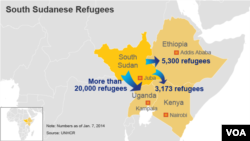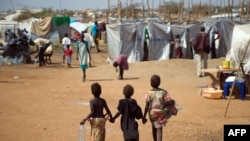MINGKAMEN, SOUTH SUDAN —
As South Sudan’s military advances on the rebel-held city of Bor, citizens are fleeing in enormous numbers, taking refuge across the river in the small village of Mingkamen.
Reverend Daniel Garang wears a priest’s collar around his neck, and a Kalishnikov rifle on his back.
“I am carrying the bullets, but really I did not shoot anything. This is 30 [bullets in the cartridge], and 31 inside [the gun], but I did not release any bullets because I am not in a position of fighting. But I can hold it for defense,” said Garang.
He has just arrived here in the village of Mingkamen on the banks of the Nile River with a group of nearly 100 people whom he helped shepherd to safety from Bor, a rebel stronghold under military assault.
He says they hid in the wilderness around Bor for four weeks, before sneaking out by boat in the dead of night.
A day earlier, they narrowly escaped a rebel cattle raid.
Violent struggle
The gun, Garang said, gives him some measure of protection as the country becomes increasingly militarized. But more than anything, he hopes for a peaceful solution to the crisis that has torn the country apart.
“Well, for me as a priest, to be peaceful is better than to be more violent. So I wish if there is a cease-fire to stop killing the civilians and the innocent people as I came with them now," he said. "You can see me as military because I’m military-minded, but I’m a civilian.”
A political power struggle between President Salva Kiir and his top rival, former vice president Riek Machar, erupted into violence in the capital a month ago, and has since spread to other parts of the country, dividing factions of the military against one another.
Some of the fiercest fighting has taken place around Bor, the capital of Jonglei state.
Tribal tensions in the country have been reignited by the fallout between Kiir, from the Dinka community, and Machar, a Nuer.
Almost all the people in Mingkamen are Dinka, and in the recent fighting they see echoes of the 1991 massacre of Dinka citizens in Bor, which they also blamed on Machar.
Humanitarian crisis
Elizabeth Yar Garang said she lost four family members, including her children in 1991, when Machar led a rebel faction, and three more, including her husband, three weeks ago.
“Why does this man Machar kill people?” she asked. "Old, young, women and children, and now he wants to be a leader. He has done this twice and we cannot forget.”
At last count, 84,000 had fled across the river to Mingkamen and other areas west of the river.
The humanitarian needs are vast. There is little shelter here, and families huddle under the shade of trees.
The British charity Oxfam has had success with a filtration system to purify Nile River water, producing about 350,000 liters a day.
As rainy season approaches, though, Oxfam field coordinator Ferrán Puig said the risk for water-borne disease will rise. He said the local government wants to move people away from the riverside.
“This area is quite low, it’s quite close to the river, and most of the people are here by the riverside. So they prefer for people to move inland just to prevent the consequences of floods,” he said.
Many of those who can afford to leave this place, taking buses to refugee camps in Uganda.
And those who cannot continue to wait for peace, as talks on a cease-fire in Addis Ababa make scant progress and battles continue across the country.
Reverend Daniel Garang wears a priest’s collar around his neck, and a Kalishnikov rifle on his back.
“I am carrying the bullets, but really I did not shoot anything. This is 30 [bullets in the cartridge], and 31 inside [the gun], but I did not release any bullets because I am not in a position of fighting. But I can hold it for defense,” said Garang.
He has just arrived here in the village of Mingkamen on the banks of the Nile River with a group of nearly 100 people whom he helped shepherd to safety from Bor, a rebel stronghold under military assault.
He says they hid in the wilderness around Bor for four weeks, before sneaking out by boat in the dead of night.
A day earlier, they narrowly escaped a rebel cattle raid.
Violent struggle
The gun, Garang said, gives him some measure of protection as the country becomes increasingly militarized. But more than anything, he hopes for a peaceful solution to the crisis that has torn the country apart.
“Well, for me as a priest, to be peaceful is better than to be more violent. So I wish if there is a cease-fire to stop killing the civilians and the innocent people as I came with them now," he said. "You can see me as military because I’m military-minded, but I’m a civilian.”
A political power struggle between President Salva Kiir and his top rival, former vice president Riek Machar, erupted into violence in the capital a month ago, and has since spread to other parts of the country, dividing factions of the military against one another.
Some of the fiercest fighting has taken place around Bor, the capital of Jonglei state.
Tribal tensions in the country have been reignited by the fallout between Kiir, from the Dinka community, and Machar, a Nuer.
Almost all the people in Mingkamen are Dinka, and in the recent fighting they see echoes of the 1991 massacre of Dinka citizens in Bor, which they also blamed on Machar.
Humanitarian crisis
Elizabeth Yar Garang said she lost four family members, including her children in 1991, when Machar led a rebel faction, and three more, including her husband, three weeks ago.
“Why does this man Machar kill people?” she asked. "Old, young, women and children, and now he wants to be a leader. He has done this twice and we cannot forget.”
At last count, 84,000 had fled across the river to Mingkamen and other areas west of the river.
The humanitarian needs are vast. There is little shelter here, and families huddle under the shade of trees.
The British charity Oxfam has had success with a filtration system to purify Nile River water, producing about 350,000 liters a day.
As rainy season approaches, though, Oxfam field coordinator Ferrán Puig said the risk for water-borne disease will rise. He said the local government wants to move people away from the riverside.
“This area is quite low, it’s quite close to the river, and most of the people are here by the riverside. So they prefer for people to move inland just to prevent the consequences of floods,” he said.
Many of those who can afford to leave this place, taking buses to refugee camps in Uganda.
And those who cannot continue to wait for peace, as talks on a cease-fire in Addis Ababa make scant progress and battles continue across the country.















